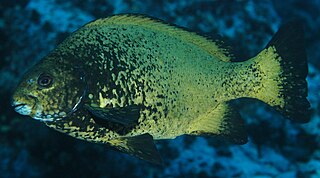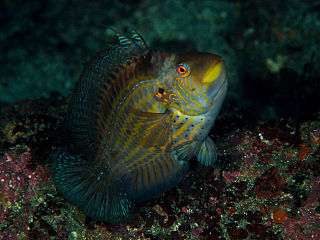
Epinephelus is a genus of marine ray-finned fish, groupers from the subfamily Epinephelinae, part of the family Serranidae, which also includes the anthias and sea basses. They are predatory fish, largely associated with reefs and are found in tropical and subtropical seas throughout the world. They are important target species for fisheries.

Sander is a genus of predatory ray-finned fish in the family Percidae, which also includes the perches, ruffes, and darters. They are also known as "pike-perch" because of their resemblance to fish in the unrelated Esocidae (pike) family. They are the only genus in the monotypic tribe Luciopercini, which is one of two tribes in the subfamily Luciopercinae.

The sea chubs, also known as rudderfish and pilot fish and in Hawaiian as enenue or nenue, are a family, Kyphosidae, of fishes in the order Perciformes native to the Atlantic, Indian and Pacific Oceans usually close to shore in marine waters.

Pseudolabrus is a genus of wrasses native to the eastern Indian Ocean and the Pacific Ocean.
Nannoperca or pygmy perch is a genus of temperate perches endemic to freshwater systems of Australia.

Percichthys is a genus of temperate perches native to freshwater habitats in Argentina and Chile.

Cephalopholis is a genus of marine ray-finned fish, groupers from the subfamily Epinephelinae in the family Serranidae, which also includes the anthias and sea basses. Many of the species have the word "hind" as part of their common name in English.

Dermatolepis is a genus of marine ray-finned fish, groupers from the subfamily Epinephelinae, part of the family Serranidae, which also includes the anthias and sea basses. They are found in the western Atlantic, Pacific and Indian Oceans.

Gymnocephalus is a genus of ray-finned fishes from the family Percidae, which includes the perches, pike-perches and darters. They are from the Western Palearctic area, although one species, Gymnocephalus cernua has been accidentally introduced to the Great Lakes region where it is regarded as an invasive species. They have the common name "ruffe" and resemble the true perches in the genus Perca, but are usually smaller and have a different pattern.

Hyporhamphus is a genus of halfbeaks. The species in this genus are distributed throughout the warmer seas of the world, most species being Indo-Pacific and there are some freshwater species.

Fodiator is a genus of flying fishes. It is the only genus in the subfamily Fodiatorinae.

Neosebastes is a genus of marine ray-finned fishes, belonging to the subfamily Neosebastinae, the gurnard scorpionfishes, part of the family Scorpaenidae. These fishes are found in the Indian and Pacific Ocean.

Chlorurus is a genus of parrotfish from the Indian and Pacific Oceans.

Scorpis is a genus of marine ray-finned fish from the family Scorpididae which are native to the eastern Indian Ocean and the Pacific Ocean.

Pteragogus is a genus of wrasses native to the Indian Ocean and the western Pacific Ocean.

Equulites is a genus of ponyfishes native to the Indian Ocean and the western Pacific Ocean. Analysis of mitochondrial DNA published in 2017 has suggested that Equulites elongates is in fact a species group made up of three species Equulites aethopos, Equulites elongates and Equulites popei.

Paralabrax is a genus of fishes in the family Serranidae. They are known commonly as rock basses. The nine species in the genus are native to rocky reef habitat in the eastern Pacific and western Atlantic Oceans, where they are often dominant predators in the ecosystem. They are also commercially important in local fisheries.

The iris wrasse(Lapanella fasciata) is a species of marine ray-finned fish from the family Labridae, the wrasses. It is found in the eastern Atlantic Ocean from Portugal to Morocco, as well as Madeira and the Azores, and in the Mediterranean Sea as far east as the Adriatic Sea. It lives in deep, rock areas where it feeds on crabs, molluscs and polychaete worms.

The ara, otherwise known as the saw-edged perch or the Dageumbari (다금바리) is a species of marine ray-finned fish from the monospecific genus Niphon in the monogeneric family Niphonidae. It is found in the Western Pacific Ocean from Japan south to the Philippines where it inhabits rock reefs and inshore waters with rocky sea beds. This species can grow up to 1 metre (3.3 ft) in total length. The ara was first formally described in 1828 by Georges Cuvier in the Histoire naturelle des poissons which he co-authored with Achille Valenciennes, the type locality was given as the Sea of Japan.

The school bass is a species of marine ray-finned fish, it is the only member of the monotypic genus Schultzea which is part of the subfamily Serraninae which itself is classified within the family Serranidae, along with the anthias and groupers. It is found in the western central Atlantic Ocean. This species is found in deeper waters near coral reefs where it forms small groups which feed on plankton. The school bass is a synchronous hermaphrodite. The generic name honours the American ichthyologist Leonard Peter Schultz (1901-1986) who was Curator of Fishes at the United States National Museum who examined the specimens described by Loren P. Woods (1914-1979) as Schultzea campachanus, which was later shown to be a synonym of Hildebrand's Serranus beta.



















